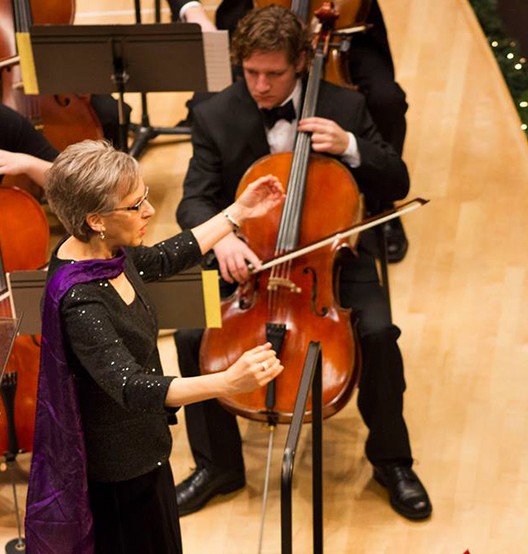Lying over a chair in Dr. Debra Brubaker’s office is a black t-shirt with a logo printed along the bottom that reads, “sing from your ovaries.” Brubaker, whom everyone knows as “Dr. B,” has been a member of the Goshen College faculty for 17 years, and has also conducted the Women’s World Music Choir since its beginnings in 2004. The women’s choir sings music from around the world, and in concert its members are arrayed in colorful scarves and floor-length black dresses that cover their bare feet.
As Dr. Brubaker tells the story, the choir came into being after James Heiks, a former professor of music at Goshen, said “You can’t have a college without a men’s choir,” to which she retorted, “Well, you can’t have a men’s choir without a women’s choir.” Goshen now has both.Before becoming the director of the women’s choir, Brubaker, a slim woman with a strong presence and a penchant for scarves and silver earrings, had never been drawn to the sounds of women’s choirs, because those she had previously heard had “nice, pretty, high voices” and “sang about lost love or flowers or something.” As she saw it, if she was going to direct a choir, she needed something more substantial.
Today, choir rehearsals begin by having “one good minute,” a time to share a poem or a thought, followed by a back rub train. Brubaker has put a strong emphasis on the connections between women, something she sees as very horizontal, much like a web.
“One part is affected and another part picks that up. They understand.”
She believes that this connectedness is not only a part of being a member of the women’s choir, but that it is a part of life for women around the world.
This, combined with her love for world music, has led her to direct music from places as far apart, both culturally and physically, as Africa and Bulgaria. She focused on the music of everyday life—the songs of birthing and dying, of work and celebration that touched people with their honesty. The music she directs is often about women: women defending other women, women standing up for each other. What she calls a “general high point” is when, after a concert, members of the audience come and tell her that they have been moved to tears.
Her work as a director has focused on finding music that sounds strong, something that the traditional repertoire for women’s choirs does not champion. One of the first pieces the choir performed, a Native American chant, was performed in a “powerful, throaty… almost guttural voice”–very different from most songs that the choir members had performed previously, with its emphasis on female strength and power.
Brubaker and the choir she directs have proven to be an especially important part of the Goshen experience for the women who sing in it.
Tabitha Emmanuel, a first-year student and member of the choir, said Brubaker’s style is “very engaging… she always knows the best way to get us to center down.”
And Dona Park, a sophomore, considers choir an important part of her life here.
She said, “with diversity, there’s a lot of unity.”
A lullaby that the choir is currently singing, titled “Tabula Rasa,” Latin for “blank slate,” repeats a refrain in Spanish: life, life without limits. This life, this potential that all women have within them, is something that Brubaker feels the need to celebrate. As Brubaker tells it, every woman is born with power latent within her. Every girl is born with ovaries that carry the lives of the future. Even if she never has children, every woman holds within her the lives of the future.

